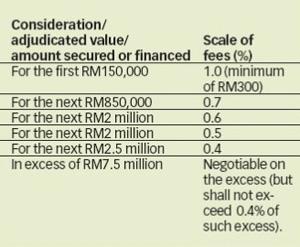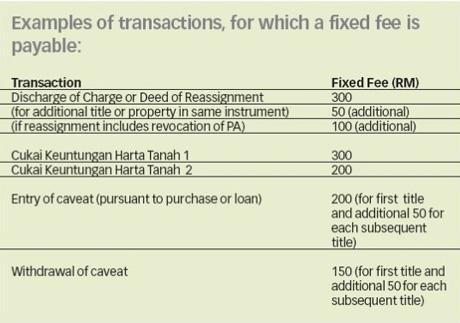How much should you pay a lawyer in a property
transaction?
08/09/2006 The Sun-Law & Realty By Andrew Wong
Before you
engage a lawyer to act for you in a property transaction, it is prudent to
ask the lawyer to give you an estimate of the legal fees and disbursements
that will be incurred to complete the transaction. This will prevent any
misunderstanding or dispute when the lawyer's bill is rendered for payment,
and will also allow you to know, from the outset, how much you will have to
set aside for this expenditure.
Legal fees for property transactions such as sale and purchase, loan,
banking facility and other non-contentious business are governed by the
Solicitors' Remuneration Order 2005 (SRO"). Some legal fees are of a fixed
sum ("fixed fee") and others are fixed by means of a scale ("scale fee").
In transactions where a fixed fee or scale fee is payable, a lawyer cannot
charge you more, unless there is special exertion involved or unless you
have entered into an agreement with your lawyer under section 114 of the
Legal Profession Act, 1976.
Special exertion means a transaction which is required to
be carried through by special exertion in an exceptionally short space of
time, and in such a case the lawyer is entitled to charge an additional fee,
over and over the fixed fee or scale fee, as the case may be.
A section 114 agreement must be in writing and may
provide for remuneration of the lawyer by a gross sum, or by commission or
percentage or by salary or otherwise, provided that such an agreement shall
not provide for costs at a scale lower than the fixed fee or scale fee.
Where there is no special exertion or no agreement in writing, the fixed fee
or scale fee is payable, and a lawyer cannot charge you less. This is often
referred to as the "No Discount Rule".
 Currently,
the scale fees for property transactions, like sales, purchases or other
forms of conveyancing, and in respect of charges or mortgages, agreements
for financing under Islamic banking, debentures and other instruments of
security, are as follows: - Currently,
the scale fees for property transactions, like sales, purchases or other
forms of conveyancing, and in respect of charges or mortgages, agreements
for financing under Islamic banking, debentures and other instruments of
security, are as follows: -
In a case where the purchase transaction is governed by the Housing
Development (Control and Licensing) Act, 1996 ("HDA transaction"), or where
a loan is obtained to finance a HDA transaction, a lower scale of fees will
apply:
(a) RM250 if purchase price or the loan sum (as the case may be) is RM45,000
or below;
(b) 75% of the applicable scale fee specified above, if the purchase price
or the loan sum (as the case may be) is above RM45,000 but not more than
RM100,000;
(c) 70% of the applicable scale fee specified above, if the purchase price
or the loan sum (as the case may be) is above RM100,000 but not more than
RM500,000;
(d) 65% of the applicable scale fee specified above, if the purchase price
or the loan sum (as the case may be) is in excess of RM500,000.
For transactions where legal fees are not determined by a fixed fee or by
means of a scale, a lawyer may only charge a fee that is fair and reasonable
having regard to the circumstances of the case; the importance of the matter
to the client; the skill, labour, specialised knowledge and responsibility
involved on the part of the lawyer; the complexity of the matter or the
difficulty or novelty of the question raised; where money is involved, the
amount or value thereof; and the time expended by the lawyer. For such
transactions, there is all the more reason why you should ask for an
estimate of fees.
It is important for you to know that the fixed fee or scale fee includes
allowances for the time of the lawyer and his clerk and all usual and
necessary attendances, and also charges for normal copying and stationary.
If you are charged an additional sum for copying or stationary, you are
entitled to ask your lawyer for an explanation as to how these additional
charges have been incurred.
However, the fixed fee or scale fee do not include: registration fees on
documents requiring registration; stamp duties; counsel's fees, auctioneer's
or valuer's fees; travelling or accommodation expenses; fees paid on
searches; costs of extracts from any register or record; disbursements
reasonably and properly paid and incurred (which is required to be itemised
in any bill); and cost of any extra work.
In your lawyer's bill you may see an item for miscellaneous charges in the
disbursement column. Such miscellaneous charges should not exceed RM50. If
your lawyer has itemised all the charges and disbursements incurred on your
behalf, then there should not be any more miscellaneous charges.
After your transaction has been completed you are entitled to ask your
lawyer for an account of actual disbursements incurred on your behalf. A
lawyer is required to return all unused disbursements to his client.
A lawyer may charge interest at 8% per annum on his disbursements and fees,
after one month from a demand made on his client.

The writer is the Deputy Chairman of the Conveyancing Practice
Committee, Bar Council, Malaysia www.malaysianbar.org.my |